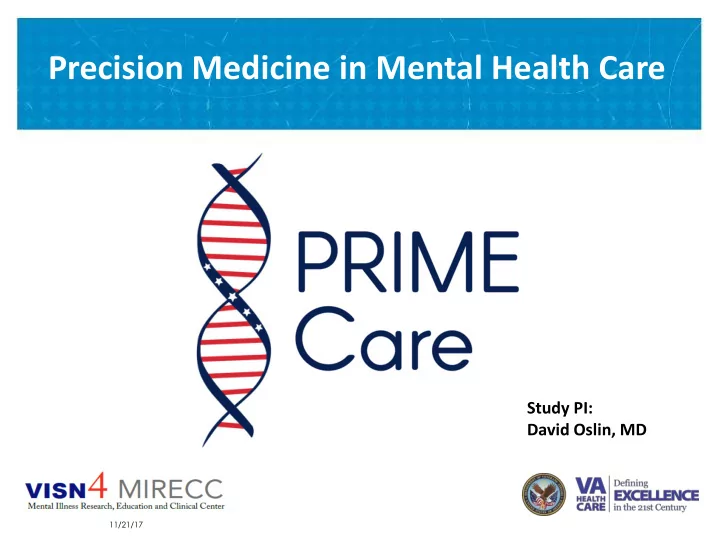

Precision Medicine in Mental Health Care Study PI: David Oslin, MD VETERANS HEALTH ADMINISTRATION 11/21/17
Background: Public Health Significance • Depression is one of the world’s great public health problems • At least 1 in 7 Veterans suffers from a depressive disorder • Depression is implicated in 75% of suicides • Untreated/poorly treated depression amplifies the burden of all common chronic medical illnesses • Although many effective therapies are available, only about 1/3 rd remit with the first medication and 1/3 rd will remain depressed despite multiple treatment trials • There are no reliable clinical tools to match each patient with the AD that is the most likely to be effective 2 VETERANS HEALTH ADMINISTRATION
Personalized Medication Selection Factors Pharmacogenomics ??? Pharmacogenomics Patient Experience Current Meds Adherence Adverse Effects Family Illness Personalized History Medication Cost Selection 7 VETERANS HEALTH ADMINISTRATION
Precision Medicine in Mental Health Care (PRIME Care) • Program Project • Principal Investigator: David Oslin, MD • Operational Partners / Advisory Board: Office of Mental Health and Suicide Prevention, VINCI, plus advisory board members from QUERI, Genomic Medicine Program, Bioinformatics, Million Veteran Program, Pharmacy Benefits Management, and Specialty Care Services among others • Funding Support: VA HSR&D SDR 16-348 10 VETERANS HEALTH ADMINISTRATION
PRIME Care • Program project grant with 5 cores • Implementation • Methods • Discovery • Value Assessment • Knowledge Translation • Activities center around the conduct of a randomized clinical trial to test the “utility” of genetic testing 11 VETERANS HEALTH ADMINISTRATION
Primary Hypotheses • Will providers understand and use the test results? - Provider/patient dyads in the intervention group will use fewer contraindicated medications based on established PGx criteria • Do patients benefit? Veterans with MDD whose care is guided by the results of the PGx battery (the intervention group) will have higher rates of depression remission • Secondary outcomes related to returning genetic results, alternate outcomes, and knowledge discovery VETERANS HEALTH ADMINISTRATION
Clinical Trial Design • Multi-site RCT (n=2,000 depressed patients) • Patient/provider dyads will be randomly assigned to: – Intervention Group: receives results of the PGx battery right after randomization – Delayed Results Group: receives results after 6 months of treatment as usual • Outcomes measured over 6 months from randomization by centralized outcome group (by telephone) VETERANS HEALTH ADMINISTRATION
Patient Criteria Need to be: • Symptomatic MDD (Single or Recurrent) • Starting an antidepressant • On monotherapy • Cannot have schizophrenia, bipolar disorder • Cannot have serious, unstable medical condition • Doesn’t require hospitalization, detox or other urgent care services at the outset of treatment 8 VETERANS HEALTH ADMINISTRATION
Pragmatic trial • Determined by Provider (Referral Form handout): – Symptomatic MDD (Single or Recurrent) – Starting an antidepressant – On monotherapy – Cannot have schizophrenia, bipolar disorder, active SUD – Doesn’t require hospitalization or urgent care services at the outset of treatment • Determined by self report / chart review – PHQ9 >9 – Age 18 - 80 VETERANS HEALTH ADMINISTRATION
THE INTERVENTION VETERANS HEALTH ADMINISTRATION 10
Pharmacogenetic Test Report (1 st Page) 11 VETERANS HEALTH ADMINISTRATION
Pharmacogenomic Polymorphisms Studied in PRIME Care Pharmacokinetic Pharmacodynamic CYP2D6 SLC6A4 (serotonin transporter) CYP2C19 5HTR2A (serotonin 2A receptor) CYP2C9 HLA-B*1502 (Human Leukocyte Antigen)* CYP1A2 HLA-A*3101 (Human Leukocyte Antigen)* CYP2B6 CYP3A4 UGT1A4* UGT2B15* *Not part of the core antidepressant battery 12 VETERANS HEALTH ADMINISTRATION
How Genetics Can Affect Medication Blood Levels 13 VETERANS HEALTH ADMINISTRATION
VA Study Sites Recruiting – Albuquerque, NM – Minneapolis, MN – Ann Arbor, MI – Palo Alto, CA – Baltimore, MD – Philadelphia, PA – Boston, MA – Pittsburgh, PA – Cincinnati, OH – Puget Sound, WA – Cleveland, OH – Richmond, VA – West Haven, CT – Salisbury, NC – Denver, CO – San Francisco, CA – Little Rock, AR – W. Los Angeles, CA – Miami, FL – Wilmington, DE VETERANS HEALTH ADMINISTRATION
Cumulative recruitment Cumulative Veteran Randomization - All Sites 1400 1200 Cumulative Veteran Randomization 1000 800 600 400 200 0 Month and Year Planned Actual VETERANS HEALTH ADMINISTRATION
Baseline Characteristics of Randomized Sample Sample size (n=388) Sample size (n=388) Age 47 + 15 PHQ-9 score (SD) 17.2 (4.7) Race (% Caucasian) 67 % PCL score (SD) 43.2 (16.7) (% African American) 20 % GAD-7 (SD) 14.0 (4.7) Sex (% male) 74 % Alcohol use (% at risk) 21 % Post 2001 (%) 32 % Marijuana (% recent use) 21 % Financial status (% can’t make ends 17 % Other drugs (% recent use) 4% meet) Tobacco (% with any use) 32 % Provider type Prior psychotherapy (% with) 67 % MH 85 % Prior meds (% with 1 or more) 88 % PCP 8 % No prior treatment 6.2 % Other / unknown 7 % VETERANS HEALTH ADMINISTRATION
Provider Characteristics Characteristic All providers Primary care Mental health P value ( N = 332) providers providers ( N = 93) ( N = 239) Age 49.9 (12.6) 49.9 (11.2) 49.8 (13.1) 0.97 Female 182 (55%) 52 (56%) 130 (54%) 0.80 Year completed formal training 2000 or 149 (45%) 56 (60%) 93 (39%) < 0.001 before After 2000 183 (55%) 37 (40%) 146 (61%) Time spent in clinical practice 0 – 49% 48 (14%) 21 (23%) 27 (11%) 0.009 50% or more 284 (86%) 72 (77%) 212 (89%) VETERANS HEALTH ADMINISTRATION 17
Provider Knowledge Characteristic All providers Primary care Mental health P value ( N = 332) providers providers ( N = 93) ( N = 239) Aware that the FDA-revised 87 (26%) 18 (19%) 69 (29%) 0.08 drug labels to include information about PGx Ordered a genetic test for 72 (22%) 40 (43%) 32 (13%) < 0.001 disease susceptibility or diagnosis in the past year Ordered a PGx test for 42 (13%) 7 (8%) 35 (15%) 0.08 psychotropic medications in the past year VETERANS HEALTH ADMINISTRATION 18
Recommend
More recommend